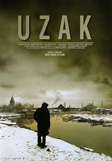
|
|
'Uzak'
(Distant)
Ron Holloway, Moving Pictures, May 17, 2003
One of the dark horses in this
year’s race for the Palme d’Or, Nuri Bilge Ceylan’s Uzak (Distant) has
arrived in Cannes after receiving three major awards at the Istanbul festival
just last month. The jury there awarded it the Turkish film of the year
“for its seemingly simple and enchanting style, and the way it blended
the scars of relationships with masterful urban imagery.” That same jury
of peers, in an unusual moment of largesse, also gave Ceylan the best
director of the year award for the film’s “masterful and measured combination
of ever-changing city lights, cinematic space and the inner world of its
characters".
Not to be outdone, the lofty FIPRESCI jury at Istanbul also bestowed its
International Critics’ Award (in memory of the late Onat Kutlar, the critic-history
of the late Onat Kutlar, the critic-historian who rescued Yýlmaz Güney’s
banned films from oblivion while the director was serving a prison sentence)
on Ceylan’s Uzak for its multi-layered approach to the personal distance
of the individual in relation to urban time and space” (a convoluted paean
of praise, although the feeling behind it appears sincere). It is likely
that Fipresci was making up for past oversights. The organisation had
bypassed Ceylan’s Kasaba (The Small Town, 1997), programmed at the International
Forum of Young Cinema at the 1998 Berlinale. They also chose Claude Miller’s
so-so experimental French entry La classe de neige over Ceylan’s tender
and affectionate Mayis Sikintisi (Clouds of May, 1999) in the competition
at the 2000 Berlinale.
The Small Town, filmed in black-and-white, is an impressionistic portrait
of family life in an isolated village that is remarkable for its misty
images, as though the entire film is the director’s own nostalgic dream
of times past. It received a Special Mention in the Prix de Montréal competition
for new directors at the 1998 Montreal World Film Festival.
In Clouds of May Ceylan probes the psyche of a documentary filmmaker
– again an autobiographical portrait – whose next production project takes
him from Istanbul to the Anatolian village of his birth. The filmmaker’s
concern for his project, however, prevents him from appreciating the rather
obscure distress of his father, who needs his son to help validate his
legal claim to a piece of land on which he has already built a house.
As the title hints, Clouds of May leaves us with images reminiscent of
Turner’s landscape paintings: the peace of an idyllic wooded retreat and
the languid beauty of a summer evening, to which are added the faces of
people reflecting their deep roots in the rhythms and traditions of a
rural community.
Distant picks up where Clouds of May left off. The rural cousin in Clouds
of May who asks the filmmaker to help him find a job in the city is the
same young man who comes knocking on a photographer’s door in Distant.
Mahmut (Muzaffer Özdemir), a photographer in his mid-forties and divorced,
lives a quiet, unassuming, well-ordered existence in a tiny but tidy Istanbul
flat. For all practical purposes, he has turned away from the outside
world to nurture an inner life of calm with simple daily rituals, a self-imposed
exile he has freely chosen (or so he thinks) to concentrate on his work
and preoccupations. Each day, he goes to the same bar at the same time
to order the same beer. And then he feels the need for sex, a woman comes,
takes care of him and departs without saying a word.
Into this closed world comes his cousin from the country: Yusuf (Mehmet
Emin Toprak), in his mid-twenties and unemployed after the factory in
his area has closed down. Yusuf is hoping to find a job on the docks,
then board a ship as a sailor “to see the world and get paid for it too”.
At first, Yusuf is impressed with Mahmut’s style of living, although house
restrictions allow him to smoke only in the kitchen. But day after day
during a dreary winter, with time on his hands and nothing really to talk
about to a man who doesn’t like to communicate anyway, Yusuf gives up
the search for a job – and a woman – and reluctantly decides to return
home.
Yet this is only part of the story. The theme of Distant is found in its
title: the slow passage of time, a space giving way to nothingness, a
relationship that dies on the vine, a void that is never filled with anything
meaningful, a life eventually felt (and experienced by the audience) for
what it is: barren and colourless. Twice, provided by Ceylan as a frame
of aesthetic reference, we see Mahmut viewing a videotape of a Tarkovsky
film.
Nuri Bilge Ceylan is an auteur in the fullest sense of that jaded filmmaking
term. He handles every phase of production: producer (‘NBC Film’ refers,
of course, to the initials of his name), screenwriter, director, cameraman,
set designer, co-editor. In Uzak the image is the whole film.
|

